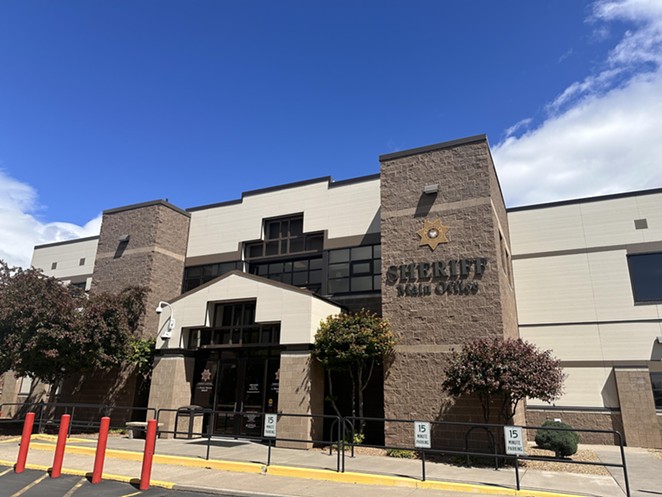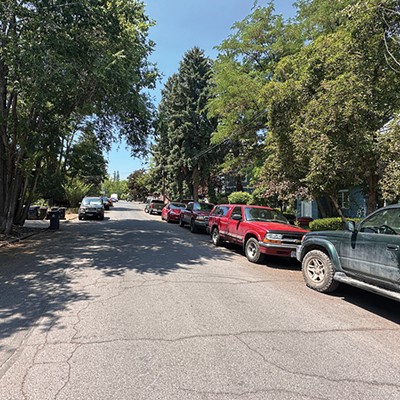The county, which just accepted the first portion of grant money to create its deflection program, announced that the Deschutes County Sheriff’s Office will lead the program. While the program is still in the planning process, the county will put this initial $300,00 toward hiring a new position to coordinate the system.
In March, lawmakers passed HB 4002, which aims to help Oregon’s drug crisis through recriminalizing drug possession and connecting people to treatment as an alternative to court and jail, through the creation of deflection programs.
Deflection programs are intended to be a collaborative effort between law enforcement and behavioral health systems, diverting individuals with substance use disorders and/or behavioral health disorders to community-based treatment.
Peer navigators from local treatment facilities including BestCare and Ideal Option will respond to a scene after an individual has had contact with law enforcement and provide treatment options.
Before the passage of Measure 110, Oregon’s drug decriminalization citizen initiative, Deschutes County didn’t have adequate treatment capacity, according to County Commissioner Phil Chang. While funds from the measure were able to expand capacity, issues came with the lack of incentives to get people into treatment. Chang hopes this program will remedy those problems.
“I don’t know whether it’s going to work or not, but I’m hopeful that this is going to actually create the driver that we need to get people to go through treatment,” Chang said.
With HB 4002, counties were given the ability to create their respective deflection programs. While the program will be a collaborative effort, one entity leads the effort and is responsible for duties such as managing grant activities, facilitating meetings with community partners and making decisions on criminal charges.
Earlier this year, that position was appointed to the behavioral health department – a decision that Deschutes County Behavioral Health Director Holly Harris said they made quickly and early on in the process.
“That relationship between law enforcement and providers is really critical to make this work, so that’s a benefit of having it live in the Sheriff’s Office. . . there’s a more direct connection." — Holly Harris
tweet this
“We felt like it was a really good plan because [the program] did sort of lend itself more to a behavioral-healthy type of model,” said Harris.
After some deliberation, community partners determined that following an already established and working model would allow for a quicker and easier implementation. Harris informed County Commissioners at a May 29 meeting that the county is now following Marion County’s model.
In 2018, Marion County created a Law Enforcement Assisted Diversion program which follows the same system as deflection programs, allowing law enforcement to divert low-level offenders away from traditional criminal justice services and toward social services.
The only difference between this and Deschutes County’s originally planned model, Harris said, is that the Deschutes program is led by the Sheriff’s Office.
With this method, individuals going through the program can be directly connected to law enforcement versus going through behavioral health before being connected to law enforcement.
“That relationship between law enforcement and providers is really critical to make this work, so that’s a benefit of having it live in the Sheriff’s Office. . . there’s a more direct connection,” said Harris.
Having law enforcement embedded and connected with individuals in this way helps build a relationship and build trust, which Harris said is critical to these types of programs. Chang, who has high hopes for the success of this program, was surprised to hear that the County was shifting the key coordination role from behavioral health to the sheriff’s office.
“I want to hear from the sheriff’s office that they are committed to the integration and coordination in pursuing this,” he said.
County entities and partners, who have been meeting for the last couple of months, will continue to meet over the next two months to finalize more details – what crimes are eligible for the program, what outcomes they are looking for and what data is doing to be collected.
According to District Attorney Steve Gunnels, the meetings have been productive.
“We in Deschutes County have a very positive collaborative approach to these things when they come up,” he said. “This is a new program for everybody. Everybody’s just trying to work out the best way to run this program so that it will be successful.”
Program details will be fleshed out and then sent out to Oregon’s Criminal Justice Commission, which oversees the Behavioral Health Deflection Grant Program, in July. The commission will then be able to grant the county the remaining funds for implementing the program.
Harris expects the money will come in September, the same month that HB 4002 goes into effect, and that the program will begin rolling out shortly after.
“It’ll be trial and error a little bit to make sure that we get everything right,” said Gunnels. “We’re hoping to start small with the program and build it out, so that we’re not getting ahead of ourselves with the kinds of cases that can come in and so on.”
Commissioner Chang sees this collaboration between partnerships as a promising step in the right direction.
“We’ve learned from other prior experiences that it really does take good coordination among these entities to do something like this,” he said.
Chang pointed out the now-halted Adult Drug Treatment Court, which he said was very successful, but extremely resource intensive. While the program eventually shut down due to a lack of resources, he credits the partnership of entities such as the DA’s office, behavioral health, law enforcement and Adult Parole and Probation as the reason the program ran so well.
“My hope is that we see similar coordination and integration of efforts for the deflection program,” he said.

























